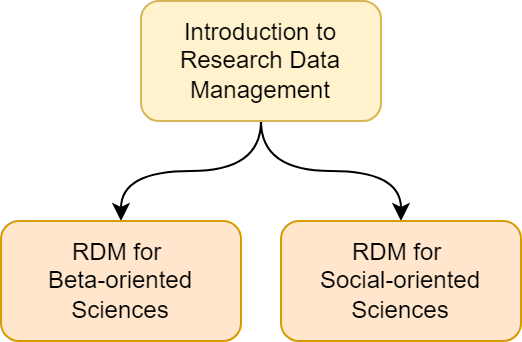Workshops
We are excited to announce our new series of workshops designed to enhance your research data management and programming skills. The workshops are designed based on the feedback we received from faculty members back in October 2024. This series of workshops has three main flavors:
- Research Data Management
- Reproducible research software & code
- Git & GitHub for code management
Each of the flavors will be provided at two levels: Introductory and intermediate.
If you have a group of researchers that need help on a topic, you can also email us for an On-Demand session, email us at datateam.geo@uu.nl.
Research data management
The data you collect, process, and use is important not only for your research, but potentially for others as well. To ensure that others can find, access and re-use the data that you have created, it is essential that research data will be handled in a structured and effective way, so it becomes. Findable, Accessible, Interoperable and Reusable (FAIR).
In the introductory workshop, we will demonstrate the benefits of applying FAIR principles to achieve your research goals. We will also demonstrate how to store, organize and document, your research data, ensuring that others can understand and reuse it effectively.
The intermediate workshops will be provided in two flavors. One for Beta-oriented research, emphasising modelling and simulations and dealing with big data quantities. The second flavor is for Social-oriented research, highlighting conducting interviews and surveys and involving personal data. These workshops can be considered as a follow-up to the introductory workshop, which will cover other topics that build on the knowledge gained in the introductory workshop.

During these intermediate workshops, participants will be provided with a sample dataset, and both theory and best-practices will be offered on how to prepare the data and make it ‘FAIR-ready’. In addition, we will guide participants through the process of publishing the dataset in a repository, ensuring it is accessible and reusable by others.
Please register to attend these workshops with the button below:
Register here for all workshops!Git and GitHub
Git and GitHub are important tools for writing and versioning your code, and we have two workshops to get you started and collaborating on code writing:
- Getting Started with Git and GitHub will help you create your own repositories, make code commits to track your progress, and publish your code effectively.
Our next Getting Started with Git and GitHub workshop is November 28 - Collaboratively Writing Code with Git and GitHub will guide you through workflows for making commits as a team or contributing to larger projects. Key Git concepts such as branches, forks, pushing, pulling, merging, and many more will be demonstrated and demystified. We highly encourage participants in this workshop to have taken our Getting Started with Git workshop or have prior experience with basic Git commit workflows. We also encourage teams to request a group instruction session. To request a group session please email us at: datateam.geo@uu.nl.
Our next Collaboratively Writing Code with Git and GitHub workshop is January 14, click the button below to register:
Reproducible Research and Code
- Introduction to Programming will get you started with how to choose a programming language, setting up a coding environment by Conda, using Jupyter notebooks to interactively learn to write code, and introduce you to resources available from Utrecht University on your programming journey. For simplicity in educational settings, we primarily use Python. However, you are welcome to use other programming languages if you prefer.Our next Introduction to Programming session is December 3, click the button below to register.
- Writing Reproducible Code This is the follow up workshop of the Introduction to Programming to cover more advanced topics on reproducible coding. It is designed for those who are already familiar with programming or on their coding journey, and want to learn how to structure, share, test, and publish their code in a reproducible way.
Our next Writing Reproducible Code workshop is January 25, click the link below to register:
Feedback and Suggestions
Have you taken one of our workshops and want to give feedback, or want to suggest a new workshop. We are always open for your thoughts, click on the appropriate button below to share your thoughts and ideas.
New Workshop Idea Workshop SurveyWe have been running workshops for several years now, and all of our materials are available openly. You can find our prior training materials and workshops in the links below.

